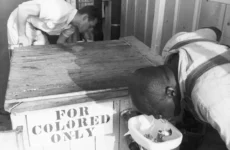Please click the link below to subscribe to a FREE PDF version of each print edition of the Niagara Reporter
http://eepurl.com/dnsYM9
By: Tony Farina
The three host cities that have received casino payments from the Seneca Nation since 2002 that ended last year are hoping for a Merry Christmas this year in the form of a favorable arbitration between the state and the Senecas scheduled to begin this week on Wednesday (Dec. 12).
Niagara Falls, which was forced to raise taxes in the 2019 budget to close a gaping $13-million deficit, along with Buffalo and Salamanca have been hard hit since the Senecas stopped paying the state under terms of the gaming compact because revenue sharing language was not included in the 2016 extension of the 14-year agreement.
State Assemblyman Angelo Morinello (R, C, I,-Niagara Falls), a lawyer and retired judge, was restrained in commenting on the high-stakes arbitration scheduled to start on Wednesday and the state and the Senecas are saying absolutely nothing.
“I trust the process,” said Morinello who served for 14 years as a Niagara Falls City Court judge. “I trust the process and absolutely hope the outcome is based on the law governing the issue. It will be a fair process and both sides will have to be prepared for whatever the outcome is.”

Gov. Cuomo and his lawyers negotiated a pact with the Senecas that didn’t include payments past 2016.
The outcome is anything but certain and sources say now that both sides have filed all the paperwork necessary to start the proceeding, the bell is about to ring on what happens next, an arbitration that could spell disaster for Niagara Falls and Salamanca, and have a lesser impact on Buffalo, but an impact nonetheless.
The 2002 gaming compact has provided New York State $1.4 billion in casino revenue over the last 14 years, according to the Seneca Nation, in exchange for exclusive gaming right to operate the three casinos in Western New York. That $1.4 billion represents 25 percent of the slot revenues which the state then shared with the host cities.
While the Senecas have stopped payments, saying they are abiding by the compact language, the Seneca leadership has signaled it was willing to negotiate new financial agreements with the host cities for services but none of the cities have pursued that course, leaving the future payments in the hands of the state and the Senecas as they prepare for arbitration. The Seneca Nation made its last quarterly payment of about $30 million last March.
The state and the Senecas have said next to nothing about the arbitration, almost a news blackout, and sources say the state has a very short witness list to press its position that language notwithstanding, the payment structure remains in place. Not so, say the Senecas, saying they have lived up to the agreement and the 2016 extension does not include language for any more payments. The gaming compact will be up for renewal in 2023.

The Niagara Falls City Council, which faces a $13 million deficit, must find a new source of revenue to replace the $12- $16 million per year that the City received from the Senecas.
Niagara Falls Mayor Paul Dyster has stood in virtual lockstep with Gov. Andrew Cuomo, as he did in the last gaming crisis, saying the Senecas remain obligated to make payments and he has been assured by Cuomo “that any assertions to the contrary are categorically incorrect.”
Salamanca Mayor Michael Smith, himself a Seneca Nation member, has said he’s counting on the two sides to settle their differences although there’s no hint that the two sides have been even talking going into the arbitration.
Niagara Falls, against the recommendation of the state comptroller, has been using casino revenue to balance its budgets since 2014 and the loss of the casino money has threatened the city’s financial well-being, with even more trouble ahead if there’s no favorable outcome.
A source close to the Seneca Nation said if the arbitration process does actually begin this week, a decision could come fairly quickly. Newly elected Seneca President Ricky Armstrong could not be reached for comment.
Especially for Niagara Falls, it could be a sad Christmas if the arbitration process goes sour. Cuomo has already provided a $12.3-million loan to help close next year’s Cataract City deficit to be repaid with a favorable outcome. If no favorable outcome, what then?





















